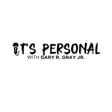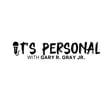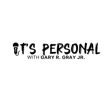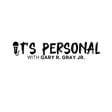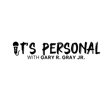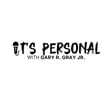Become a Creator today!Start creating today - Share your story with the world!
Start for free
00:00:00
00:00:01

#ItsPersonal III 85. Brandy Colbert chats writing at a young age and high school!
Brandy is such a joy! During this podcast, the award-winning author chats about her early writing experiences growing up, and how it felt taking on a less traditional path in regards to her carreer.
Brandy has writing a variety of books for young people. Her books have been chosen for many awards and placed in libraries around the world. But what else does she like to do?
Find out some of Brandy's hobbies, such as watching tv and a special type of dance you will never guess! Listen to Brandy share parts of her story on episode 85 of ItsPersonal Podcast.
Website: https://www.brandycolbert.com/
Twitter: https://twitter.com/brandycolbert
Instagram: https://www.instagram.com/brandycolbert/
Transcript
Introduction and Notable Works
00:00:19
Speaker
Yeah, hi, my name is Brandi Colbert. I'm the author of several books for kids and teens. That's always like my little line. And sure, how many, like, can you maybe name just a few of them for those out there who may not have seen or heard of some of your books? Yeah, I think I'm best known. I have several YA books out, but I'm probably best known for Little and Lion and Now the Voting Booth. And my first middle grade came out last year, and that's called The Only Black Girls in Town.
00:00:24
Speaker
Welcome back everyone to another episode of It's Personal.
00:00:46
Speaker
I love that book so much. It is one of my favorite books. One of my favorite books. Let's start with just like I think your writing journey. And I think I always usually try to start there because I think it's important for not just adults to hear, but I think anyone who is just trying to do this work today and have been doing it for a while. So what does it look like for you in the beginning in regards to your writing?
Early Writing Journey
00:01:14
Speaker
Yeah, well, actually I was a kid writer, so I've been writing since I was like seven. I think that's when I started sort of writing at home. We would have these writing contests at school and then I started writing. I would
00:01:26
Speaker
actually illustrate at first, like I would draw pictures sort of sitting in front of the TV. You know, I was an 80s kid, so there was like no restrictions on screen time. It was like I sit in front of the TV. And then I would start like writing, you know, sort of underneath the pictures and dialogue bubbles. And then I was like, I actually like the writing better than the pictures. So that just kind of continued. And I have like stacks and stacks of notebooks from when I was a kid. And they were basically like all ripoffs of like, you know, Judy Blume and
00:01:56
Speaker
anyone else I was reading back then and I had all these like meticulous like series planned out so I had like seven or eight books I mean I was like real serious about it as a kid and then I kind of lost that you know when I got to college I didn't know you could like go to school for creative writing like it just wasn't something that would have flown in my house I don't think so I was like well you know I'd studied some journalism in high school so I was like I really liked doing that so then I can write and
Path to Publication and Family Support
00:02:26
Speaker
you know, also talk to people and just sort of like get a degree in that so it's not creative writing. So I got a degree in journalism and I was still writing like a little bit but not a lot. And then when I was about, you know, 25, I was like, you know, I still had this dream of being published but I hadn't really finished anything, you know, as an adult. And so I did NaNoWriMo, the National Novel Writing Month. It's like the only time I've ever done it.
00:02:52
Speaker
uh it was like 15 years ago and I finished a book and so from there you know I took one writing class and that was just sort of also for motivation but from there I just did I didn't know anybody who was a writer I didn't you know the internet was like around of course but it wasn't really it was like 2005-2006 so it wasn't really like what it is today like a lot of literary agents were still requesting you to send things through the mail and
00:03:18
Speaker
So I just did all my research and started querying agents and I wrote four books before I got an agent. And that fourth book was my first published book called Point.
00:03:32
Speaker
And yeah, I just kind of went off from there and I still have the same agent. So it took me four years of querying and lots of query letters, but I ended up with the right agent. Yeah. I love it. I love it. And I think one of my questions is, and I think I've asked this question before because a lot of creative people and writers often go through the same situation. You mentioned that
00:03:59
Speaker
it wouldn't have flown in your family. Can we just go back there just for like a second? What was that like, that process? And I'm assuming you did have support. Like I know there was support through your journey, but what was it like going through that journey where knowing that it's going to be a little bit tricky navigating an idea of how you feel about something, but other people, family members, friends may not really truly understand that.
00:04:29
Speaker
Yeah, I think it was kind of a weird thing because, you know, um, I grew up in the Midwest. I grew up in Springfield, Missouri. So that's like part of the Ozarks. Um, since down in the Southwest corner of the state. Um, you know, we didn't really have, we had like two bookstores for awhile when borders was opened. And now I think there's like just a Barnes and Noble there. There may be an independent store there, but you know, books were, well, actually that's not true. There were like the mall bookstores at the time. So.
00:04:56
Speaker
like in the 80s and 90s, we had like Walden Books and Be Dalton and we'd go to those. But eventually, you know, those kind of closed and it just wasn't really an arts heavy town. So I never met an author. I didn't think it was like a viable career. And so I think that my parents probably also sort of had that view. You know, they came from the South from rural Arkansas where they grew up. And so definitely, you know, there were no people who were making a living in the arts coming down there to talk to kids or people.
00:05:24
Speaker
So it just didn't seem like a viable career. And I think they would have been like, like they were always very supportive. Like, you know, bought me books are very supportive of, you know, me spending my allowance on books. Like they were all about that, you know, helping me buy notebooks and pens to write back in the day. But I just think that it didn't seem like something that someone could actually make a career out of. So they were more concerned with me being able to have a life where I could support myself instead of like, go try this career where a lot of people fail.
00:05:56
Speaker
It's so true. And I hear that story so much. And I love, I don't want to say I love hearing the story because I think that oftentimes we as a society just look at specific jobs as like, you know, like those are the jobs that are secure and you know what they are. And parents and other friends, they all kind of project those ideas on us. And I kind of went through the same thing.
00:06:23
Speaker
Can you talk a little bit about just like your schooling as well?
Influences and Personal Interests
00:06:26
Speaker
Because you said you always have been writing and putting books together and drawing. Was it influences there through other teachers that have influenced you to do those things? You know, no, I always feel so sad when, you know, people talk about like they had that one teacher, you know, like someone I'm sure is going to be like, Mr. Gray was like, amazing. Yeah, I could have done this without him. I didn't have that experience. You know, I had
00:06:52
Speaker
I grew up in a really white town. Um, and I don't know if some of that contributed to it. Like I don't want to say that there were like, that there were necessarily lower expectations for me because I always got really good grades. I was always one of the best, you know, students in the class. So I think my teacher is expected a lot out of me, but again, it's like sort of the area where I grew up and maybe the time period that I grew up in.
00:07:15
Speaker
and maybe also being one of the very few black students in my schools, I just didn't feel like I really got that encouragement. I would say like my second grade teacher, which is when I first started sort of discovering my love of writing, like she's the person that I do remember being probably the most supportive out of me, like my entire schooling. But, you know, I did kind of feel like I was on my own for a lot of it, which,
00:07:40
Speaker
It's a little bit sad when you think about that now. But it is, I think it is cool that like second grade, like I don't, I think sometimes people don't necessarily even remember their second grade teacher. So like for it to be your second grade teacher, I think that's really cool. And for whatever reason that teacher influenced you.
00:08:02
Speaker
He, she, they must have really done something to spark or can allow you to continue that love for writing or for whatever it is that you enjoy doing. Because teachers have so much influence on kids, as you know, and they can just as much open up a dream and crush a dream at the same time. So that's nice to hear. That's really, really nice to hear.
00:08:28
Speaker
Yeah, she was great. Like she was just really open. And I felt like just kind of made us feel like we could do anything, you know, whereas they maybe didn't feel that with other teachers, but she was she was just really cool. So yeah, I love that. I love hearing that. I love hearing that. Brandy, what are some things that you like to do outside of obviously reading and writing? Yeah, that's funny. Of course, those are usually the first go tos for us writers.
00:08:53
Speaker
You know, I really like TV, which is funny, uh, cause, you know, I feel like a lot of people are like, you shouldn't watch TV, you know, watch your brain and all that stuff. But I, like I said, there were no restrictions on it at my house, um, growing up. So I've loved TV since it was terrible. So now that it's like really good, I'm like, there's so much to catch up on. Um, but it's also goes back to, I think storytelling. You know, I didn't know it at the time as a kid, but it was, you know, a lot of my books were also sort of rip offs of television shows I was watching.
00:09:22
Speaker
or certain episodes and things like that. So I think from an early age, I really connected to the storytelling. So I really like all kinds of TV, but I also like really gotten into cooking a lot the last couple of years, especially during the pandemic now, like, you know, home all the time. I like doing yoga.
00:09:43
Speaker
That's another thing that I've done for years, but during the pandemic, now I'm like doing a daily yoga practice and that's surprising probably to no one more than myself. I like going on hikes, you know, friends with friends, movies. Yeah, just kind of, I feel like all the normal stuff, like I don't have like a, I wish I had sort of like a specific hobby that I could point to. Well, one of them is tap dancing, I guess, but I don't get to do it as much as
00:10:13
Speaker
Yeah, I don't get to do it as much as I would like, but I started tap dancing as a kid and did that for like eight years from when I was like seven, I think to like 15. And then as an adult, I've just taken classes like here and there where I can, but it's one of those things where it's like,
00:10:29
Speaker
riding a bike for me, like as soon as I step into a tap class, I'm like, yep, I'm back. That's so impressive. Is that just something that runs in the family or just? No, I don't know anybody who did it yet. Like I remember, I think I probably just had a lot of energy as a kid. Like I have an older brother who's like six years older than me and he is like, you know, we're all pretty bookish in my family, but like,
00:10:53
Speaker
were very different and so he was very much like I just kind of want to be alone all the time or maybe like hang out with one or two close friends and I had like a bunch of friends growing up and I think a lot of energy and just like wanted I'm not really I don't think I'm an extrovert but I feel like I was a very extroverted kid so I always wanted to be around people and I don't even remember but I think at some point I was probably like I want to try dance classes so that was like a big part of my childhood. I love that.
00:11:19
Speaker
Yeah, I feel like there's something very special about having sort of that connection to dance. Like I, you know, had my dance friends that weren't necessarily like most of them didn't go to school with me. And it was just like a separate part of my life where I got to also express myself, which I think is really important at that age. Indeed, often take stories from your childhood and put them into your books.
00:11:42
Speaker
I wouldn't say like straight away like stories like I sort of there's a little bit of me in each of my books probably the only black girls in town would be the closest but that's not even my story like I would have wished so hard for
00:11:57
Speaker
you know, a black girl my age to move in across the street, that never happened. But just sort of for feelings and the way, you know, she hadn't had anyone around to express those feelings too. A lot of that was sort of my childhood. But no, I haven't, I haven't even been able to set a story in Missouri yet. Like it just, every time I start, I'm like, nope, can't do it yet. I wonder why. And I think that's okay, right? I think that's okay. And I think part of that journey is
00:12:23
Speaker
just figuring out like what you're comfortable with and I think if you get there great if not then it's still okay that you don't so yeah yeah yeah yeah can we talk a little bit about family and what does that look like for you growing up in your household and you said you have one simply
Family and Cultural Experiences
00:12:43
Speaker
Yeah, so now I have four. So it was just me and my dad and mom and brother for several years. And then my parents got divorced when I was 12. And that was like pretty devastating to me because I didn't see it coming. Like there wasn't any fighting.
00:12:58
Speaker
were just like a really quiet, you know, family. So I think my older brother, like I said, he's six years older than me. So he was 18. So and he was just about out of the house when that happened. Like he left pretty much when it happened for college. So he saw it coming. I did not. So that, you know, pretty much like rocked my world in a way that I wasn't expecting.
00:13:18
Speaker
And then my dad got remarried, and he had three more boys. And so I have four brothers. And I'm just really far part in age from all of them. So I don't really feel like, you know, there's like 16 and 18 years between me and my younger brothers, and then there's six years between me and my older brother. So in a weird way, I always kind of felt like I was an only child, which I think is really strange to have so many siblings and feel that way. But that's kind of how I felt growing up.
00:13:50
Speaker
As a kid, like you said, even with the second grade teacher, there's so much that you only remember, right? And you often don't notice things until you get older and you're like, oh, now that you talk about it or now that you say it, I can name it or I can picture it or I understand it a little bit more. You mentioned also that your school, you're one of the only Black kids and oftentimes that's the case, unfortunately.
00:14:12
Speaker
Yeah, yeah, and I think
00:14:18
Speaker
Do you remember what that felt like, whether it was in the elementary, middle school or high school? How did that feel? And what were some of the, I don't want to say negatives or positives. Let's just keep it like, what did that feel like for you as you were kind of navigating that? Yeah, I mean, it was definitely, it was a struggle. You know, my family moved across town, sort of, you know, they were sort of like,
00:14:47
Speaker
the side of town where the Black people lived. It wasn't totally segregated, but kind of. And then the side of town where the more white people lived. And so my parents moved us over to what would be considered the white side of town in second grade. And I remember walking into my new second grade classroom and just looking around and being like, oh my god, everyone in here is white. I feel like I don't know if my parents told me. I guess they told me on some level, but I was seven years old, so I didn't
00:15:16
Speaker
maybe understand what that was going to look like. But you know, I had a lot of friends. I always felt like, like, I don't know if popular is the right word, but you know, I always felt like I was in that crowd. Like I was very involved in school. I, if there was, you know, there were definitely a lot of ignorant comments and racism, and I didn't necessarily know how to respond to a lot of that at the time. But I definitely like when,
00:15:44
Speaker
I could, I stood up for myself. So, you know, it was a struggle in some ways, but it was also, you know, not to be cliched, but I do feel like it made me like a stronger person and I can walk into pretty much any situation and just be like, okay, I've experienced this because, you know, I probably experienced it as a kid, you know. But I don't know, you know, looking back, it's
00:16:10
Speaker
I'm sure it affected me in ways that I still am not aware of, but I think those of us who were there, there's probably like a handful of black kids, you know, that I sort of knew growing up. I would say that, you know, we all just did the best we could to get by. I've talked to some of them, like we had our 20th high school reunion a few years ago now. And we were, I was talking to some of my other black classmates and it was funny because one of them, he's,
00:16:38
Speaker
biracial and then he came out as gay after like many years after we graduated but he's like super happy married to a man they've got three amazing kids um but i was talking to him and i was like you know what was it like for you and he's like well actually it wasn't probably the same for me as it was for you because he actually was raised by the more by the white side of his family and he was more concerned about like
00:17:02
Speaker
nobody finding out that he was gay. So it was like funny because we all I'm sure had very different experiences even within like that small group there. Wow. Wow. And I think it would be so interesting just to hear more of those stories about people that you grew up with and just how they navigated it because at that time you unfortunately are sometimes just in survival mode and just trying to like hopefully get through the day without
00:17:31
Speaker
Yeah, just sometimes just not being seen, right? Like you just want to hide and be away from people. But also at the same time, honor the friendships that you have with those people that you create them with during those times. Because those friendships are so important because there's often
00:17:49
Speaker
for me at least, I had a lot of friends from my community there, which was great, but there was probably like, I don't know, 20 or 30 of us, and then the rest of the school was wiped. So, like, you tried to hold on to those as much as possible without, I don't know, driving yourself crazy, I guess. Yeah, that's a really good way to describe it. I look back and I'm like, I still can't believe, like, that was our life, you know, and we just, like, dealt with it, and also it was like,
00:18:19
Speaker
know the 80s and the 90s and so there was a lot less sensitivity around you know any of like
00:18:24
Speaker
identity stuff, like anything like that, so. Exactly, yeah. So you're not like, for one, you're not being taught it. No one's really asking you to share. No one's teaching other people how to be curious about other people and ask respectful questions and like all of those things are not even on the table. So no one's getting the work and everyone's just kind of like on their own limb of trying to figure out how to
00:18:53
Speaker
get to know other people, which is, yeah, as you know, can be very difficult for one of the only black kids in the school. Totally, totally. So I just have a few more questions for you.
TV Preferences and Upcoming Projects
00:19:08
Speaker
And I want to go back to your love for TV. What are some things you love to watch on TV, whether it's a movie or a show? Oh, gosh, I have like
00:19:19
Speaker
such like a high low taste like you know so I love a good drama like pretty much any you know black drama that comes out I will at least check out but some of my favorites um or like comedy drama dramedy I guess you would call it like I love Atlanta which I don't know if we'll ever be getting another season of it but those first two or three were gold um
00:19:41
Speaker
I love Insecure. What else do I love? You know, two of my favorite shows ever are like Breaking Bad and Better Call Saul, which surprises me. I had to really try to get into Breaking Bad very hard. And then once I got in, it was like all in. I love, one of my favorite shows ever is the show Felicity, like that show with Keri Russell where she's in college and it's just like very quiet and everybody just kinda whispers the whole time and like, it's just so much angst.
00:20:09
Speaker
And then another one would be Daria, that cartoon from the 90s that I loved. There's so much I love. And then I also love really trashy reality shows. I love the Real Housewives franchise. I'm like a Real Housewives historian. I love it. I love it because I think a lot of people will say, oh, I can't watch that. It's just a bunch of women yelling at each other.
00:20:37
Speaker
100% true in some cases. But it's also really, you know, as much as it's not scripted, but it's like produced, you know, so they'll say like, you two need to go to this
00:20:48
Speaker
go hang out today and film and talk about this one topic. But as much as it's produced that way, it's still real humans and real emotions. And I just love that insight into all these different women. And some of them are really terrible. But a lot of them are just really funny. And I just really enjoy it, especially during quarantine. It's been kind of great to just have that sort of energy, because you can't be around people.
00:21:14
Speaker
So they're like going on all these fantastic trips and just, it just feels like a different world, even though, you know, they're just real people that I really, I love housewives.
00:21:23
Speaker
I love that. You know, it's so funny because my wife is probably gonna kill me, but she loves the show as well. And she's always like, don't tell anyone that I like it. I was like, it's fine. Like, whatever. It's just another show. Like, there's other TV shows that are probably a lot worse. So, and if you're, if you're watching it and you're finding things like you just mentioned, like, it's fine. Like, everyone has their own tastes in different shows. So I 100% agree with you. I totally do.
00:21:53
Speaker
I've gotten like some like story ideas from it like someone reminded me because now I've like I just talk about it when I'm on panels all the time and you know like podcast interviews but someone was like oh you know you're both the revelation of Bertie Randolph they were like yeah you said it was like sort of you got one of the ideas for the sisters
00:22:12
Speaker
because there's a sister relationship on The Real Housewives of Beverly Hills, and one of them is an addict, and then the other one is not, and they just have a really fraught relationship. And I was like, my gosh, you're right. I totally forgot about that. So I think it can, like, provide some inspiration in some ways, too, for storytelling. 100, yes. Totally. Totally, totally great. I want to thank you so much for hanging out. Just sharing so much about you and your story. Where can people find you online?
00:22:40
Speaker
Yeah, thanks so much for having me. I'm just pretty simple. It's brandykolbert.com and then I'm on Twitter and Instagram at brandykolbert. Awesome. And I guess I always ask as well, like, is there anything we can look forward to this year for you in regards to the writing?
00:23:01
Speaker
Yeah, yeah, I realized last night I did an event with a friend and I forgot I have a couple of paperbacks coming out this year. So the paperback for The Only Black Girls in Town and The Voting Booth will be out this year. And then I have my first nonfiction book. It's about the Tulsa Race Massacre of 1921 that will be out on October 5th from Balzer and Bray. That is so, I mean, I'm so excited for you.
00:23:27
Speaker
I'm so excited for you. I think it's going to be awesome. And again, I just love.
